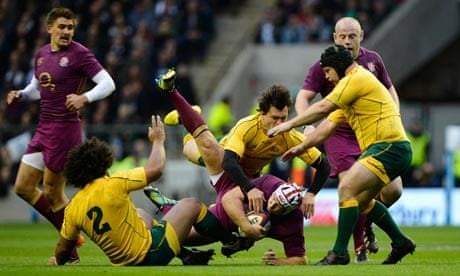People who sell tickets for profit on resale websites such as Viagogo and Seatwave could be "named and shamed" and even face court action to force them to hand over the money, following a landmark supreme court ruling.
Viagogo, one of the biggest so-called secondary ticket brokers, will now have to hand over to the Rugby Football Union (RFU) the names and addresses of people who sold on tickets to England rugby matches via its website.
The RFU told the Guardian that once it had the names, "appropriate sanctions will be handed down". These could range from individuals or clubs having their ticket allocations suspended or being publicly named and shamed to legal action to force sellers to return the profits they made from selling the tickets.
The ruling has huge implications for the UK's burgeoning secondary ticketing market and for the touts and other individuals who sell tickets on these sites, whether it is for a rugby match or the Rolling Stones. It opens the door for other sporting bodies and event promoters to adopt the RFU's stance now the supreme court has given the organisation its backing.
Law firm Hogan Lovells said the decision "means individuals who believe they have online anonymity can be identified", and added it was likely to help those attempting to get internet service providers and other firms to hand over details of people who have posted defamatory material online.
Yet Viagogo was, at the time of writing, still selling tickets to the England v South Africa game at Twickenham on 24 November. The cheapest ticket on sale was priced at £124.99, while the most expensive was £599.
When someone books to go to a concert, sporting event or show it will usually say somewhere in the terms and conditions that the ticket cannot be resold. For example, the small print on the See Tickets website states: "By ordering, you agree that the tickets are for the personal use of you and your party only, and will not be resold or transferred. Any resale or attempt to resell the tickets at a price higher than purchased will result in your orders being cancelled without prior notification."
But such conditions are rarely enforced, and in recent years this has led to an explosion in the numbers of people buying and selling concert and sporting event tickets via secondary ticket selling sites.
However, the RFU is one of the few bodies that does enforce its ticketing terms. Its view is that anyone who enters Twickenham with a ticket sold for more than its face value is trespassing, so it went to court to get an order forcing Viagogo to reveal the names and addresses of people who advertised for sale and/or sold tickets for 2010's internationals and the 2011 Six Nations championship.
Viagogo has been battling to keep hold of its customers' details, but the RFU succeeded in defeating the company's appeal at the supreme court. The ruling could deter some touts from using secondary sites.
The RFU said: "Today's dismissal of Viagogo's final appeal sets an important precedent for the sporting industry that rights holders should retain the ability to control their ticketing policy and pricing. If a seller is found to be listing these tickets on secondary websites they face tough sanctions, including possible court action."
Its chief commercial officer, Sophie Goldschmidt, said: "Selling tickets through secondary ticketing sites is against our terms and conditions and allows prices to be inflated, preventing many of our supporters from purchasing. We now plan to identify such sellers and take tough sanctions to keep our tickets off secondary ticket sites and in the right hands."
It is not known how many Viagogo customers are affected by the ruling, but the RFU said: "In terms of tickets listed [on Viagogo], it's in the thousands." Viagogo said the number was "a handful".
The RFU said member clubs or a debenture holder caught reselling tickets could potentially have their ticket allocation suspended or withdrawn. At the top end of the scale it could take an individual to court "to return the profit they made on the tickets". It added: "Naming and shaming is an option as well."
Asked about the fact Viagogo was still offering tickets for sale on its website, the RFU said Viagogo should be making clear to its users that they are "listing at their own risk". It is only able to take action retrospectively, but could later decide to take steps to identify those selling tickets to forthcoming events.
In a statement Viagogo said that despite the ruling "the resale of rugby tickets is still legal. In fact, more people are reselling rugby tickets on Viagogo than ever before ahead of England's autumn internationals against South Africa and New Zealand".
Spokesman Ed Parkinson said: "While the RFU may have run off with a handful of names from sales that took place several years ago, I can assure you this will not happen again … Our data protection is now better, so fans may therefore now buy and sell rugby tickets on Viagogo with absolute confidence that their information will be protected in future."
However, a spokesman was unable to be more specific about these measures.

Comments (…)
Sign in or create your Guardian account to join the discussion